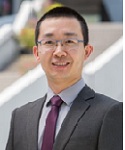| Biography | |
|---|---|
 Dr. Shubo Wang City University of Hong Kong, Hong Kong (China) |
|
| Title: Photon Momentum Effects in Artificial Microstructures | |
| Abstract: Light carries both linear momentum and angular momentum. The interactions between light and matter lead to momentum transfer/conversion that not only change the propagation of light but also induce forces on matter. These photon momentum effects can give rise to counterintuitive phenomena in artificial microstructures (i.e. man-made structures with desired properties). In this talk, I will discuss several phenomena that deepen our understanding of the fundamental properties of photon momentum. I will report that the light-induced force on a metamaterial boundary can be either pushing or pulling depending on the symmetry of microstructures [1,2]. I will also report that photonic spin-orbit interactions enabled by artificial microstructures can induce chirality-dependent lateral optical forces [3] and arbitrary-order non-Hermitian exceptional points [4]. Interpretations of these phenomena could help to resolve a century-old debate about photon momentum in media and generate novel applications such as ultra-sensitive optical sensors and sorting chiral molecules using light-induced forces.
References: [1] S. Wang, J. Ng, M. Xiao, and C. T. Chan, “Electromagnetic stress at the boundary: Photon pressure or tension?”, Science Advances 2, e1501485 (2016). [2] W. J. Sun, S. Wang, J. Ng, L. Zhou, and C. T. Chan, "Analytic derivation of electrostrictive tensors and their application to optical force density calculations", Physical Review B 91, 235439 (2015). [3] S. Wang and C. T. Chan, "Lateral optical force on chiral particles near a surface", Nature Communications 5, 3307 (2014). [4] S. Wang, B. Hou, W. Lu, Y. Chen, Z. Q. Zhang, and C. T. Chan, "Arbitrary order exceptional point induced by photonic spin-orbit interaction in coupled resonators", Nature Communications 10, 832 (2019). | |
| Biography:
Dr. Shubo Wang obtained the B.Sc. degree in Physics at Shandong University in 2009 and the Ph.D. degree in Nano Science and Technology at the Hong Kong University of Science and Technology (HKUST) in 2013. He then worked as a Visiting Scholar in the Department of Physics and Institute for Advanced Study at HKUST. He joined the Department of Physics at City University of Hong Kong as an Assistant Professor in 2017. Dr. Wang’s research focuses on theoretical study of light-matter interactions including advanced wave-functional materials (e.g., metamaterials and photonic crystals) and optical forces. He has published 24 papers in peer-reviewed journals including Nature Communications, Science Advances, Physical Review Letters, and Physical Review X, among which some are selected as "Editors' Suggestion", highlighted as "News and Views" in Nature Photonics, and awarded the William Mong Outstanding Paper Award. He has delivered 11 invited/keynote talks at international conferences.
| |
